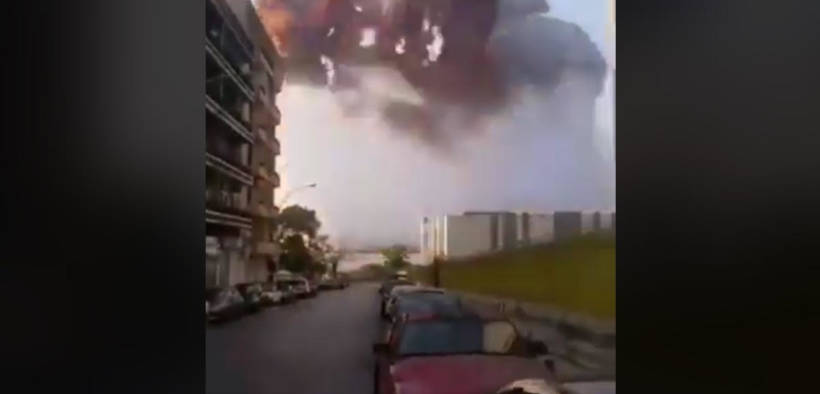At Least 70 Killed And Thousands Injured After Massive Explosion In Beirut

“I went around Beirut today after the blast. The damage is shocking. Every single residential building, every shop, every hotel, every restaurant, almost nothing left untouched by the pressure from the blast. The streets are covered in broken glass, as if it rained shards of glass.”
A massive explosion devastated the Lebanese capital Beirut on Tuesday, killing at least 70 people and injuring thousands. The blast, which came from the city’s vital maritime port, is believed to have been caused by an estimated 2,750 tons of ammonium nitrate that had been stored in a warehouse for years.
“I promise you that this catastrophe will not pass without accountability. . . . Those responsible will pay the price,” said Lebanese Prime Minister Hassan Diab in a televised speech. “Facts about this dangerous warehouse that has been there since 2014 will be announced and I will not preempt the investigations.”
This is what it was like to be on the ground in Beirut when the explosion happened. It’s easily a couple of miles from the blast site. pic.twitter.com/hMhldr3Xpd
— Ian Miles Cheong (@stillgray) August 5, 2020
Beirut port, before and after the blast. #BeirutBlast #BeirutExplosion pic.twitter.com/vTwUORUVx4
— Syrian Girl (@Partisangirl) August 4, 2020
“So far Lebanese general security believes it was accidental, unrelated to politics or any political faction,” tweeted journalist Rania Khalek, who is based in Beirut, on Tuesday. But according to the Washington Post, other officials believe that Israel could be involved:
But suspicions lingered that Israel may have been involved, said a senior Lebanese army officer who spoke on the condition of anonymity because the issue is sensitive. Numerous witnesses reported hearing warplanes overhead at the time, he noted.
“There are suspicions,” the official said. “There will be no conclusion until there has been a full investigation.”
Israeli planes and drones have been spotted flying with increasing regularity over the city in recent weeks as the tensions have risen.
President Trump backed suspicions that the explosions were an “attack” in a press conference Tuesday, saying that U.S. generals believed it was “a bomb of some kind.” Defense Department officials denied Trump’s claim, according to CNN.
The explosion comes at an already difficult time for Lebanon, as the country is suffering a severe economic crisis that has seen food prices double and the national currency lose 80% of its value. With a war-torn Syria on its eastern border and an enemy state in Israel to its south, Lebanon is deeply reliant on its port for imports.
Losing the port here in Lebanon at this particular moment is no simple matter. We are already going through the worst economic crisis the country faces since the civil war. There are already massive food and fuel shortages. And now we cannot import anything. Darker days are ahead
— Ali (@Ali_Kourani) August 4, 2020
I went around Beirut today after the blast. The damage is shocking. Every single residential building, every shop, every hotel, every restaurant, almost nothing left untouched by the pressure from the blast. The streets are covered in broken glass, as if it rained shards of glass
— Rania Khalek (@RaniaKhalek) August 4, 2020
Tensions are further strained ahead of a coming verdict on Friday from an international tribunal investigating the 2005 assassination of ex-prime minister Rafic Hariri. The Lebanese government, composed after the end of the country’s Civil War in 1990, has struggled to provide basic services to the population and had already been the source of recent public outrage for its incompetence and corruption.







